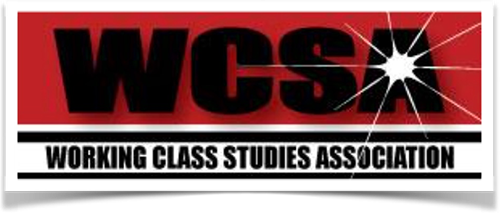WCP: The Future of Working-Class Studies

Posted in Visiting Scholars | Tagged Academia, Christie Launius, Michele Fazio, Tim Strangleman, WCP, Working-Class Perspectives, Working-Class Studies, Working-Class Studies Association
With nearly a decade and a half since the last publication of a working-class academic collection, it is time for an update on the field. In this week’s Working-Class Perspectives, Tim Strangleman, Michele Fazio, and Christie Launius discuss the Routledge International Handbook of Working-Class Studies, their upcoming collection of working class academia, specifically edited to showcase the history of working-class activism, the broad diversity within working-class studies, and potential paths forward given the challenges facing the current generation of working-class activists and academics.
In 2005, John Russo and Sherry Linkon published their edited collection New Working-Class Studies, drawing together a rich array of writers across a range of disciplines. This was by no means the first book that addressed working-class life and culture, but it set down a marker for a field that has developed much further since then by way of the Working-Class Studies Association, its annual conference and journal, this blog, and many more developments large and small in this vibrant field. Having watched the field grow over the past two decades, we thought it was time to reflect on what has been achieved and which areas might still need to be addressed. The result is the Routledge International Handbook of Working-Class Studies, forthcoming in 2019.
We set ourselves some ambitious aims in developing the handbook. We wanted to create a resource that could serve as a starting point for someone new to the field as well as a text for those already familiar with working-class studies who wanted to teach about class. But we also wanted the collection to reflect on the roots of the field, its recent work, and where it is going. As editors who have grown through working-class studies over the last two decades, we are especially attuned to the generational aspects of the field and of social class more generally. We come from a middle generation, between activists and scholars who cut their collective teeth in the 1960s and 1970s, the height of the long post-war boom and Fordism, and those coming of age today, in an era marked by precarity and an ever-widening income and wealth gap. For our generation, our scholarship and political activism are marked by a class in retreat because of job-loss and community breakdown, yet we still have strong memories of the cultures and structures of the past.
Just as our field must contend with the ways that economic change is transforming working-class life, both the working class and working-class studies must continue to engage more fully with gender, sexuality, ethnicity, race, and other aspects that shape who we are. We also can’t treat the diversity within the working class as a simple check list of ideas and identities.
Rather, as many scholars and activists have already done, we need to incorporate the insights that have emerged historically from different voices that address class through intersectional, intergenerational, and interdisciplinary analysis. A recent anthology, Know Your Place: Essays on the Working Class, by the Working Class edited by Nathan Connolly, illustrates how the complexity of identity intersects with economic and social changes. The collection includes a whole range of new writers on class, who drew deep on their own very different backgrounds. The book highlights the link between the ethnic diversity of the contributors and their perspectives as working-class people who grew up in the 1980s and 1990s in different parts of the UK. These millennials had been formed in very different ways, challenging class positions held by previous working-class cohorts. Just as these writers bring perspectives rooted in ethnic identities to Know Your Place, we know that scholars working in race and ethnic studies and similar fields have much to contribute to the working-class studies conversation. If our field is to succeed and thrive, we must be open to new and different perspectives, including ideas that sometimes make us uncomfortable. Such openness will foster renewal and growth for working-class studies.
We planned the last section of the Handbook of Working-Class Studies to encourage that kind of openness by challenging readers to think about future directions of the field and the working-class more generally. While we have our own visions, we include a broad range of voices of those who are committed to promoting working-class life and culture and hope that the Handbook will stimulate further dialogue about these matters. We will jump-start the discussion at the upcoming Working-Class Studies Association’s conferencein Stony Brook, where we will host a roundtable on the future of the field. If you’d like to contribute but won’t be at the conference, please send your ideas by email. We will integrate insights from the roundtable and the emails we receive into the conclusion of the Handbook to document the field’s vitality in community engagement, activism, and scholarship internationally.
At the end of their introduction to New Working-Class Studies, Russo and Linkon wrote that ‘Ultimately, new working-class studies is not just an academic exercise. Rather, we strive to advance the struggle for social and economic justice for working-class people.’ Nearly a decade and a half later, this is still true. Our job is to make sure we remain relevant to our people. We hope you will join the conversation.
Read the post in its entirety and other WCP posts on our website.
